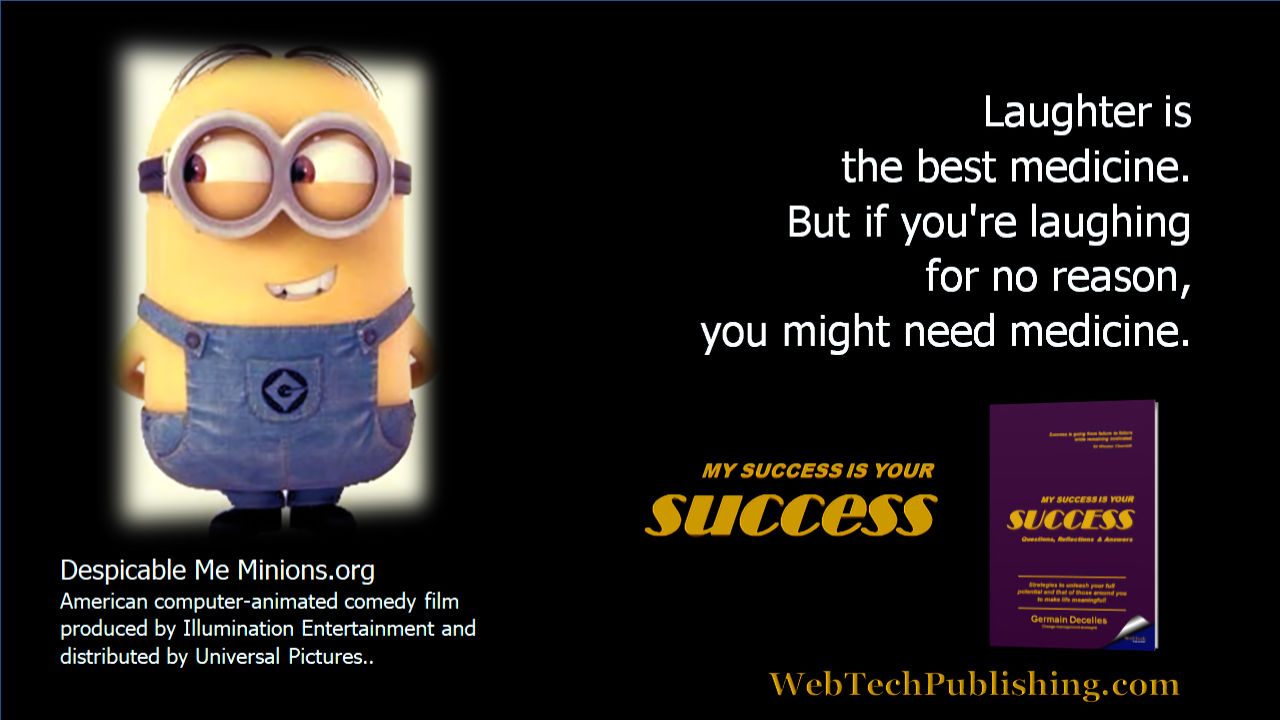|
Article published on LinkedIn.com: April 28 2023
09_HUMOR_280423_en.pdf

The quotations, short texts, and photographs in this
work remain the exclusive property of their respective
authors.
HUMOR
A sense of humor can be an amazing line of defense when it
comes to dealing with stress. Unfortunately, stress is
inevitable, and you cannot eliminate it, no matter how hard
you try.
However, you can better prepare for stress with several coping
techniques.
Developing a sense of humor in the face of life's challenges
is a great place to start.
A sense of humor will help build your resilience to stress and
improve your overall physical and emotional health.
It will also allow you to:
·
Connect with others.
·
See things in a different way.
·
Normalize your life experience.
·
Keep your relationships strong.
Fortunately, developing a healthy sense of humor isn't too
difficult, but it does take some practice.
Humor is the quality of being amusing or comical. More
specifically, the humor effect is a cognitive bias that causes
people to remember information better when they perceive it as
humorous.
For example, when students learn a new concept in a humorous
way, such as through a funny story, they are generally more
likely to remember that concept, compared to non-humorous
teaching.
The effect of humor can be very beneficial, and humor in
general provides a wide range of benefits, such as increased
interest and increased energy levels.
1.
The benefits of humor:
one of the main advantages of humor is that people are
generally better able to remember information that they
perceive as humorous, compared to information that they do not
perceive as humorous.
This benefit, called the humor effect,
extends to different types of memory, such as recognition
memory, which involves the ability to recognize things one has
encountered, and recall memory, which involves the ability to
retrieve past information.
Similarly, humor can also improve
people's memory when it comes to verbal information, such as
words and sentences, as well as when it comes to visual
information, such as pictures, and mixed information, such as
cartoons and videos.
Moreover, in addition to improving memory, humor has various
other benefits. More specifically:
a.
Humor increases energy levels:
reading or watching something funny,
has a positive and energizing effect. This is beneficial for
people's general well-being and can help improve people's
memory.
b.
Humor reduces negative emotions: humor can distract from negative
emotions, such as anger or anxiety, that may be felt when
processing certain information.
This can be attributed, among other
factors, to the fact that processing humor places a heavy
cognitive demand on working memory, which means that people
focus on humor rather than the negative emotions they would
experience otherwise.
c.
Humor leads
to increased interest:
adding humor to the information you present can make
it more interesting and appealing to others.
For
example, ads that use humor get more attention from people,
and are more memorable and compelling.
d.
Humor can make others see you in a more positive way:
Humor, when used correctly in the right circumstances, can
improve the impression others have, of you.
For example, including humor in a
speech can have a positive impact on how listeners perceive
the speaker.
Likewise, using humor can
improve people's perception of your friendliness and
competence, especially when you combine it with negative
information that you need to update.
Additionally, humor and
laughter, have additional social, mental, and physical
benefits, in a wide variety of areas.
Overall, the humor effect represents a noticeable advantage,
where humorous information is remembered better than
non-humorous information.
Additionally, humor provides a variety of other benefits, such
as increased interest, increased energy levels, and reduced
negative emotions.
2.
Situations where humor can be beneficial:
as we have seen above, humor
can be beneficial in various ways.
As a result, there are many situations where humor can be
beneficial, such as:
·
When you want to cheer someone up.
·
When you want to establish a
relationship with others.
·
When you want to make a speech more
interesting.
·
When you want a project, you've worked
on, to stand out and grab people's attention.
In addition, specifically regarding
the benefits of humor on memory, there are various situations
where humor can be beneficial, such as:
·
When trying to learn new material.
·
When teaching a subject to others.
·
When you create a slogan that you want
people to remember.
·
When you formulate a key message that
you want your audience to remember.
3.
How to use humor effectively:
in order to make your humor effective,
you must pay attention to the following elements:
·
The type of humor:
you generally want to avoid hurtful humor aimed at people
directly, as such humor can alienate them.
·
The style of humor:
you will often want to avoid, very subtle, shocking, or
radical humor, as such humor may be less effective than more
cautious humor.
·
The amount of humor:
you will often want to avoid using humor too often, as it can
be boring and make you look like a clown.
·
Humor timing:
even good humor can end up being inappropriate and ineffective
if you deliver it poorly.
·
The delivery of humor:
even good humor can end up being inappropriate and ineffective
if you deliver it poorly.
4.
Adopt the right kind of humor:
To use humor effectively, it's
important to pay attention to the type of humor you use.
·
Positive Humor:
the use of positive humor is associated with a relaxed
learning environment, better retention of information,
increased motivation, increased participant satisfaction.
·
Negative humor:
the use of negative humor, and particularly aggressive humor,
is associated with poorer, learning outcomes, an anxious and
uncomfortable learning environment, more distractions, and
reduced participant satisfaction.
This indicates that it is important to use humor
that is perceived as positive, while avoiding humor that might
be perceived as negative, as the latter type of humor can harm
your goals.
Although it can sometimes be difficult to
distinguish between the two types of humor, it is generally
better to err on the side of caution and avoid using humor
that your target audience is likely to find insulting or
offensive.
Also, remember that what is perceived as
appropriate, will depend on the context and the audience to
which you are presenting information.
For example, a joke that's appropriate to tell your
friends while you're sitting in a bar may not be appropriate
during a work session or other social gathering.
Remember when you use humor incorrectly, in case it
negatively affects people's opinion of you, even if they find
the humor itself amusing. This may be the case, for example,
if you come across as a « clown, » as a result of
inappropriate or overly cheap humor, or if you use humor too
frequently.
5.
Adopt the right style of humor:
when it comes to using humor effectively, the
style of humor matters.
More precisely :
·
Humor generally works best, when it's not too poignant:
often, restrained humor can be more beneficial
than humor that goes beyond the ordinary measure, for example,
when it comes to improving people's memories, and in many
cases even simple humor, such as a funny pun, can help people
to remember the transmitted information more.
Also, over-the-top humor can
often lead to various problems, such as leaving an unpleasant
impression of you.
·
Humor generally works best, when it's not too subtle:
while you don't want to use radical humor, you
should generally avoid using humor that is too subtle, as some
people just won't notice it, rendering it ineffective.
Remember
that the optimal style of humor depends on factors such as the
context and audiences.
For
example, in some situations you can be sure your audience will
respond well to subtle humor but not overly poignant humor,
while in other cases you might know that the audience won't
notice subtle jokes at all.
6.
Humor as an effective reminder:
there are also some things to consider
when using humor specifically as a way to draw people's
attention to information and improve memory of it.
·
Humor generally works best, when tied
to the information at hand:
so try to use humor that is relevant,
and especially humor that relates directly to the information
you want to emphasize.
·
Humor can serve as a better aid to
attention and memory when it is unexpected in some way:
therefore, try to avoid information that might be perceived by
your audience as too predictable.
·
Attention to humorous information at
the expense of related non-humorous information:
it is mainly a problem if two important pieces of information
are presented one after the other. Keep in mind if you use
humor in a presentation or conversation that it is a memory
enhancer.
Remember that there is no one right way to use humor, as the
relevance and effectiveness of humor depend on factors such as
the circumstances you are in, the people whom you talk to and
the goal you hope to achieve. This is up to you when deciding
when and how to use humor.
Remember our Minion friend comment, «
Laughter is the best medicine. But if you’re laughing for no
reason, you might need medicine. »
Find out more about « how humor will help you
achieve well-being » with My Success Is Your Success.
The book through questions, quotes and reflections provides
the necessary elements to explore all about motivation so to
shape your success and help those around you do the same.
Remember that success is all about team efforts!
|

|
This book is the result of forty years
of experience acquired with local and international
organizations and companies and during consultancy,
change management, transition and marketing services.
This 404-page
personal development book was published by WebTech
Publishing and is available online in English, North
American French and European versions. For more
information and to view the flip book, visit
webtechPublishing.
|
About the Author
Decelles
Other publications:
ISO Pour Tous
– Le manuel
d’information ISO – Le guide de préparation ISO – La
gestion du changement en affaires – La gestion de
projet d’affaires – Le
changement POUR TOUS –
Change your future,
now! – Mon succès est votre succès.
Press Contact
Germain Decelles, o.s.j.
WebTech Management et Publication Incorpored
|
 |
—30 —
|